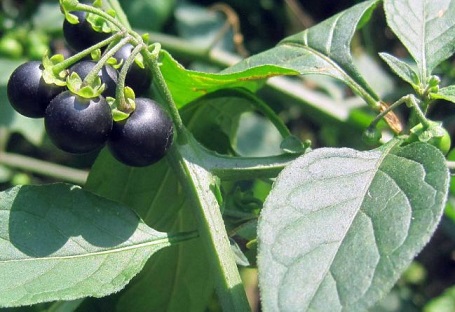Nikhil Prasad Fact checked by:Thailand Medical News Team Aug 02, 2024 1 year, 4 months, 1 week, 6 days, 16 hours, 15 minutes ago
Herbs And Phytochemicals: Researchers from institutions across the globe have uncovered a new potential weapon in the battle against multidrug-resistant oral cancer. This
Herbs and Phytochemicals news report delves into their groundbreaking study, which reveals how solanine, a natural compound found in certain plants, can inhibit the growth and spread of drug-resistant cancer cells.
 Solanine from Solanum nigrum L helps with multidrug-resistant oral cancer
Understanding the Challenge of Multidrug-Resistant Oral Cancer
Solanine from Solanum nigrum L helps with multidrug-resistant oral cancer
Understanding the Challenge of Multidrug-Resistant Oral Cancer
Multidrug resistance (MDR) in oral cancer poses a significant challenge to treatment. This resistance often leads to tumor recurrence, making it difficult to treat effectively. Over 90% of deaths among cancer patients receiving traditional or targeted therapies are linked to this resistance. Factors like tobacco use, poor diet, and genetic predispositions contribute to this issue, highlighting the need for new therapeutic approaches.
The Role of EGFR in Oral Cancer
The epidermal growth factor receptor (EGFR) plays a crucial role in the progression of oral squamous cell carcinomas (OSCC). EGFR overexpression leads to increased cell proliferation, metastasis, and resistance to chemotherapy. It activates several downstream signaling pathways, including PI3K/AKT/NF-κB, which promote tumor growth and drug resistance. Therefore, targeting EGFR and its associated pathways is essential for developing effective treatments against MDR cancers.
Solanine: A Natural Compound with Potential
Solanine, a steroidal alkaloid found in the Chinese herb Solanum nigrum L, has shown significant anticancer properties. It is known for its antioxidant, anti-inflammatory, and antimicrobial effects. Recent studies suggest that solanine can inhibit the growth of various cancer cells without harming normal cells, making it a promising candidate for cancer therapy.
The Study: Investigating Solanine's Effects on MDR Oral Cancer Cells
The study, conducted by researchers from Ajman University-UAE, Saveetha University-India, King Saud University-Saudia Arabia, and PRIST Deemed University-India, focused on the impact of solanine on multidrug-resistant oral cancer KB-Chr-8-5 cells. The researchers aimed to understand how solanine modulates the EGFR/PI3K/Akt/NF-κB signaling pathway to induce apoptosis, inhibit proliferation, and reduce angiogenesis in these cancer cells.
Key Findings of the Study
-Inhibition of Cell Viability and Proliferation
The researchers found that solanine significantly inhibited the viability of KB-Chr-8-5 cancer cells in a dose-dependent manner. At a concentration of 60 µM, solanine markedly increased cell death. Interestingly, solanine did not significantly affect the viability of normal fibroblast cells, highlighting its selective action against cancer cells.
-Increased Production of Reactive
Oxygen Species (ROS)
Solanine treatment led to a significant increase in ROS production in cancer cells. This increase was associated with decreased mitochondrial membrane potential (MMP), indicating mitochondrial dysfunction. The elevated ROS levels induced apoptosis, suggesting that oxidative stress plays a crucial role in solanine-mediated cell death.
-Suppression of Inflammatory and Proliferative Proteins
The study revealed that solanine effectively inhibited the expression of key inflammatory and proliferative proteins, such as iNOS, IL-6, cyclin-D1, and PCNA. These proteins are often overexpressed in MDR cancer cells, contributing to tumor growth and resistance. By downregulating these markers, solanine reduced inflammation and proliferation in the cancer cells.
-Inhibition of Angiogenesis
Angiogenesis, the formation of new blood vessels, is critical for tumor growth and metastasis. The researchers found that solanine significantly downregulated the expression of angiogenic factors VEGF and HIF-1α. This inhibition of angiogenesis further supports solanine's potential as an anticancer agent.
-Induction of Apoptosis
The study showed that solanine treatment led to the upregulation of apoptotic proteins such as Bax, caspase-9, and caspase-3. It also decreased the expression of the anti-apoptotic protein Mcl-1. These changes indicate that solanine induces programmed cell death in MDR cancer cells, highlighting its potential to overcome drug resistance.
Mechanisms of Action: Targeting the EGFR/PI3K/Akt/NF-κB Pathway
The researchers found that solanine effectively inhibited the EGFR/PI3K/Akt/NF-κB signaling pathway. This pathway is crucial for cell proliferation, survival, and angiogenesis. By downregulating EGFR and its downstream signals, solanine reduced the activation of key proteins involved in these processes. This inhibition led to decreased tumor growth, reduced angiogenesis, and increased apoptosis in MDR cancer cells.
Implications for Cancer Therapy
The study's findings suggest that solanine holds promise as a therapeutic agent against multidrug-resistant cancers. Its ability to selectively target cancer cells while sparing normal cells makes it an attractive candidate for further research and development. Future studies should focus on understanding solanine's effects on other tumor-suppressor pathways and its potential use in combination with existing therapies.
Conclusion
Solanine has emerged as a potent disruptor of cellular processes in multidrug-resistant oral cancer cells. By inhibiting the EGFR/PI3K/Akt/NF-κB signaling pathway, solanine reduces inflammation, proliferation, and angiogenesis while promoting apoptosis. These findings highlight solanine's potential as a therapeutic agent for advanced oral cancer.
The study findings were published in the peer-reviewed journal: Journal of Clinical Medicine.
https://www.mdpi.com/2077-0383/13/15/4493
For the latest on
Herbs and Phytochemicals, keep on logging to Thailand Medical News.
Read Also:
https://www.thailandmedical.news/news/diy-guide-for-checking-for-mouth-or-oral-cancer
https://www.thailandmedical.news/news/breaking-news-researchers-find-that-sars-cov-2-contributes-to-oral-cancer-progression,-treatment-resistance-and-tumor-recurrence
